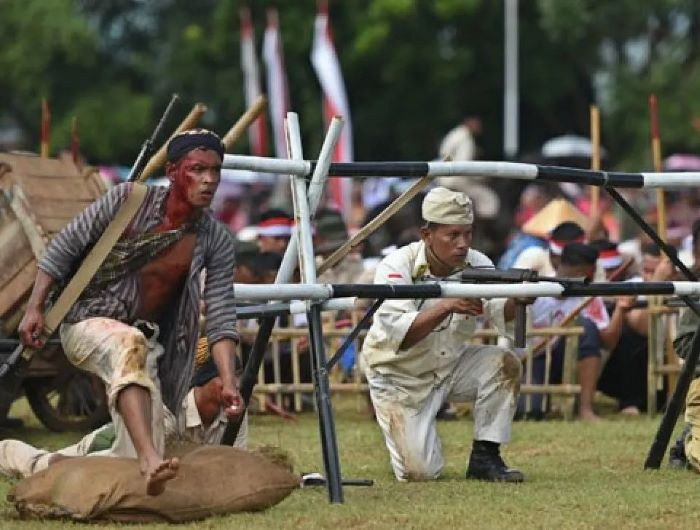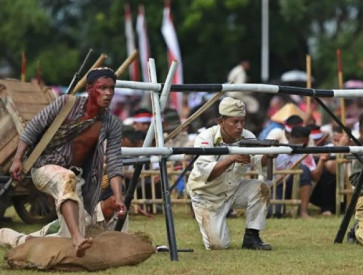Popular Reads
Top Results
Can't find what you're looking for?
View all search resultsPopular Reads
Top Results
Can't find what you're looking for?
View all search resultsThe traitors of the past are the heroes of today
Influenced by the state propaganda of that time, most Dutch people saw the war as a legitimate attempt to protect their interests, and therefore considered anyone who went against this frame a traitor.
Change text size
Gift Premium Articles
to Anyone
 Fighting spirit: Indonesian Military (TNI) soldiers reenact on Dec. 15, 2016, independence fighters who fought the Allied Forces, including the Dutch army, in the Ambarawa battle in 1945, during a commemoration of the Indonesian Army Day at Great Commander Sudirman Square in Ambarawa, Central Java. (Antara/R. Rekotomo)
Fighting spirit: Indonesian Military (TNI) soldiers reenact on Dec. 15, 2016, independence fighters who fought the Allied Forces, including the Dutch army, in the Ambarawa battle in 1945, during a commemoration of the Indonesian Army Day at Great Commander Sudirman Square in Ambarawa, Central Java. (Antara/R. Rekotomo)
O
n May 13, the Dutch government posthumously rehabilitated three Dutch Marines who, during the independence war in 1947, refused to burn down an Indonesian village. Based on moral grounds, the three refused to carry out the order and were then treated as deserters, taken into custody. They received prison sentences as if they had committed a crime instead of preventing one.
Their case is remembered as “the Pakisadji case”, named after the military post that was attacked by Indonesian fighters the day before, upon which the Dutch occupation forces took revenge. Finally, 77 years later, after the Dutch government in 2023 officially admitted that applying “extreme violence” was wrong, the reputations of the three Marines were cleared.
The rehabilitation would probably not have happened if Max van der Werff, an independent Dutch researcher, had not thoroughly researched and published about this case from 2012 onward. He traveled all the way to Indonesia to visit Sutojayan village, south of Malang, East Java, to hear the Indonesian side of the story.
Ironically, one of the politicians that recently supported the rehabilitation, Dutch Member of Parliament Sjoerd Sjoerdsma, plays a significant role in a defamation case against the man that had put the matter on the agenda. Like the three Marines then, Van der Werff is being framed as a traitor, a deserter, someone endangering the national interests of the Netherlands for his research on the downing of Malaysian Airlines MH17 flying for Kuala Lumpur from Amsterdam on July 17, 2014.
On Nov. 12, 2020, Dutch weekly De Groene Amsterdammer, published a widely spread news report suggesting that Van der Werff worked for the Russian secret service. Sjoerdsma posted on Twitter: “Impossible! A Dutchman is undermining the MH17 trial on behalf of, and probably supported by, the Russian intelligence service. This is an attack on our constitutional state.”
After the MH17 incident, Van der Werff shifted his focus from the Indonesian independence war to the unfolding regional war in Donetsk, Ukraine. In contrast to most Western journalists, he did not immediately buy the story that the Russians were behind the downing of the Malaysian airliner. Fully aware of the political implications of the plane crash in the context of an emerging second Cold War, Van der Werff simply wanted to know the truth before political powers were taking over.
He visited the plane crash site in Ukraine where he collected important evidence and testimonies, which he presented on his personal blog. While his Indonesia research had been appreciated by his Dutch peers, this was not the case with his research on Ukraine and MH17.


















